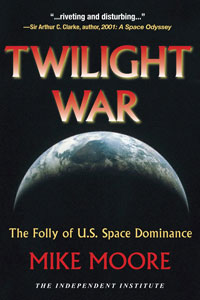Review: Twilight Warby Jeff Foust
|
| In the end, whether the United States and/or other nations weaponize space may be a question not of technology but of human nature. |
Twilight War devotes few details to the technical issues associated with space weapons; those interested in the technology behind direct-ascent ASATs or parasitic microsatellites should turn elsewhere. The book, Moore writes, “is more about values than technology”, and much of the book is indeed devoted to issues of values and policy rather than technology. This includes discussion of historical and policy background on issues ranging from the establishment of the “freedom of space” concept that allowed satellite overflights to the doctrine of precision bombing to the concept of “American exceptionalism”, which in the eyes of its proponents puts America above the other nations in the world and makes it free to do whatever it wants in world affairs. These concepts can at times seem far afield from the issues of space weaponization and space dominance, but Moore ties them all together by the end of the book.
Moore, as he has made clear elsewhere, including this publication (see “Call their bluff”, The Space Review, January 28, 2008) is a proponent of negotiations for a ban on space weapons. However, he is not a wide-eyed idealist: such a treaty, he believes, requires significant verification efforts to be worthwhile. “A new space treaty without foolproof verification measures would be a non-starter for the United States, as it should be,” he writes. “But a new space treaty, even with expensive verification measures, would be a small price to pay for avoiding a space-related arms race and a new cold war.”
In the end, whether the United States and/or other nations weaponize space may be a question not of technology but of human nature. As Moore notes in the book, one argument that some space warriors in the US have used is that, inevitably, any new medium becomes the site of conflict: just as we have fought on land, on sea, and in the air, so it is likely that one day we will also fight in space. However, Moore is unwilling to concede that this is inevitable: the US, he believes is the one nation that can make space warfare an impossibility by putting its weight behind an enforceable treaty banning space weapons. While the current administration is unlikely to make any movement in that latter direction in its final eleven months, Twilight War does offer a guide to future administrations on why an arms race in space can be prevented.
